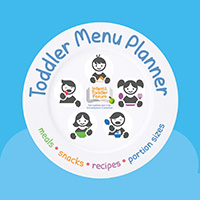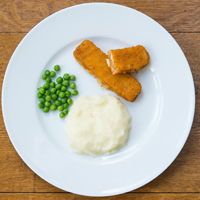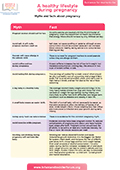
Use our Toddler Meal planning tool to ensure your 1-4 years old receives a balanced diet every day.
Find out more >
Use our toddler food tracker to check that your 1-4 year olds are getting a good balance of foods and activity
Find out more >
This educational programme for frontline professionals contains a range of practical resources on infant feeding.
Find out more >Guidance & Tips for Pregnancy
There are a number of unhelpful myths surrounding the role of diet and lifestyle in pregnancy. Many come from a poor understanding of the nutritional relationship between mum-to-be and her baby.
The table below summarises the most common myths about nutrition, diet and lifestyle in pregnancy. You can also download or print it here
|
Myth |
Fact |
|
Pregnant women should eat for two. |
No extra calories are needed until the third trimester of pregnancy when the Department of Health recommends that energy intake should increase by only 200kcal per day |
|
Avoid salt. It will make pregnant mothers swell up. |
Salt does not cause swelling, although excess consumption should be avoided because it can increase blood pressure. Healthy eating advice is to consume less than 6g per day |
|
Peanuts will cause allergy in the unborn child. |
There is no need for pregnant mothers to avoid peanuts unless they are allergic to them |
|
Avoid coffee and tea during pregnancy. |
Excess caffeine increases the risk of low birth weight, but moderate consumption (200mg/day, the amount in two cups of instant coffee) is safe |
|
Avoid eating fish during pregnancy |
Two servings of cooked fish a week (one of which should be oily) is a healthy way of consuming vital omega-3 fatty acids. Fish to avoid are swordfish, shark, and marlin due to high mercury levels, and raw fish due to the risk of food poisoning |
|
A big baby is a healthy baby |
The average new-born baby weighs around 3.5kg (7.5 lb). Very heavy babies (those over 4kg) and those that cross upwards on weight-for-age centiles during infancy are more likely to suffer from birth difficulties and longer-term conditions, such as diabetes and obesity in later life |
|
A small baby means an easier birth |
The birth of a small baby will not necessarily be easier, as the pelvis expands to allow the delivery of babies of all sizes. Underweight infants (those weighing less than 2.5kg) are more prone to infection and poor growth during early infancy |
|
Eating spicy food can induce labour |
There is no evidence for this common pregnancy myth |
|
Avoid exercise while pregnant. |
Moderate exercise helps keep pregnant women fit, reduces complications of pregnancy and labour, and helps restore body shape after birth. Pregnant women are advised, like all adults, to be active, at least at a moderate intensity, for five or more 30-minute sessions per week |
|
Smoking and drinking during pregnancy will not harm the baby |
Smoking can reduce placental function and cause slow growth. It is the biggest risk-factor for sudden infant death, and increases the risk of stillbirth, premature birth, miscarriage and low birth weight babies. Even small amounts of alcohol consumption (1-2 units/week) during the first trimester can increase the risk of premature birth. Larger amounts can lead to preterm delivery and low birth weight. Excess intake (>10 units per day) is associated with ‘fetal alcohol syndrome’ – a child with stunted growth and mental retardation. |



